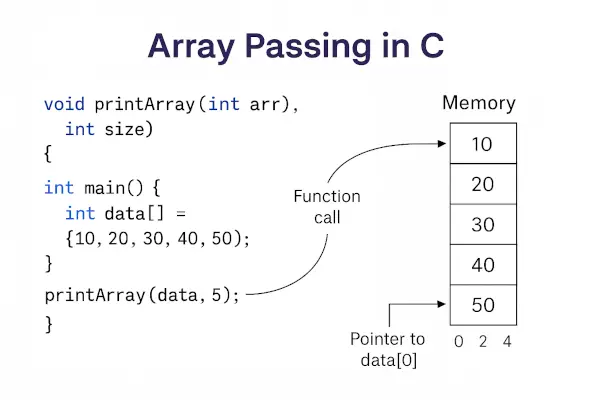In the world of C programming, arrays are fundamental tools used to store collections of data. But working with arrays becomes especially powerful when you learn how to pass them to functions. Whether you’re building an application that analyzes student scores or processes sensor data, understanding array passing in C is crucial. This guide will take you from basic syntax to in-depth examples and cover all the possible ways to pass arrays (and their elements) to functions with complete clarity.
🔢 What Does “Passing an Array to a Function” Mean?
When we pass an array to a function in C, we give that function access to the array’s elements—either to read, modify, or process them. In C, arrays are not passed by value (unlike integers or characters); instead, the memory address (pointer) of the first element is passed. So, if a function modifies an array element, the change reflects outside the function too.
✍️ Basic Syntax: How to Pass Arrays in C
Let’s start by understanding the simplest form of array passing:
#include <stdio.h>
void printArray(int arr[], int size) {
for(int i = 0; i < size; i++) {
printf("%d ", arr[i]);
}
printf("\n");
}
int main() {
int data[] = {10, 20, 30, 40, 50};
int size = sizeof(data) / sizeof(data[0]);
printArray(data, size);
return 0;
}
🔍 Explanation:
In this code:
- The
printArrayfunction takes anintarray and its size as parameters. - Inside
main, we define the arraydata[]and calculate its size. - The array is passed by reference, allowing
printArrayto access its elements.
🧾 Alternative Syntax Using Pointers
Since arrays are passed by reference, you can use pointers instead of array notation:
#include <stdio.h>
void printArrayUsingPointer(int *arr, int size) {
for(int i = 0; i < size; i++) {
printf("%d ", *(arr + i));
}
printf("\n");
}
int main() {
int nums[] = {5, 10, 15, 20, 25};
int n = sizeof(nums)/sizeof(nums[0]);
printArrayUsingPointer(nums, n);
return 0;
}
🧠 What’s Happening Here?
This time, printArrayUsingPointer accepts a pointer (int *arr) instead of using array notation. Yet, it behaves exactly the same. In C, arr[] and *arr are interchangeable in function parameters because both refer to the same memory.
✏️ Modifying Array Elements Inside a Function
Let’s take it one step further. What if we want to modify the array inside a function?
#include <stdio.h>
void incrementArray(int arr[], int size) {
for(int i = 0; i < size; i++) {
arr[i] += 1;
}
}
int main() {
int numbers[] = {1, 2, 3, 4, 5};
incrementArray(numbers, 5);
for(int i = 0; i < 5; i++) {
printf("%d ", numbers[i]);
}
return 0;
}
💡 Concept Breakdown:
This function increases each array element by 1. Since arrays are passed by reference, the changes are reflected in the original numbers[] array in main.
📌 Passing Individual Array Elements
If you only need to pass one element (rather than the full array), it’s very simple:
#include <stdio.h>
void square(int x) {
printf("Square: %d\n", x * x);
}
int main() {
int arr[] = {3, 6, 9};
square(arr[1]); // Passing only the second element (6)
return 0;
}
🧾 Explanation:
This function only receives a copy of arr[1], not the array. So, any changes inside square won’t affect the original array.
🧩 Passing 2D Arrays to Functions
2D arrays are a bit trickier because you must specify column size:
#include <stdio.h>
void displayMatrix(int matrix[][3], int rows) {
for(int i = 0; i < rows; i++) {
for(int j = 0; j < 3; j++) {
printf("%d ", matrix[i][j]);
}
printf("\n");
}
}
int main() {
int matrix[2][3] = {{1, 2, 3}, {4, 5, 6}};
displayMatrix(matrix, 2);
return 0;
}
🧠 Why Specify Column Size?
C needs to know how to move to the next row in memory. That’s why int matrix[][3] is necessary—the compiler uses the column size to calculate offsets.
📋 Summary: Key Takeaways
✅ Arrays in C are passed by reference (actually, by address).
✅ You can pass:
- Entire arrays:
void function(int arr[], int size) - Pointers to arrays:
void function(int *arr, int size) - Specific elements:
function(arr[i])
✅ Modifying array elements inside a function affects the original array.
✅ For multi-dimensional arrays, column sizes must be specified.
Understanding how to pass arrays to functions in C is a key skill for any programmer looking to write clean, modular, and reusable code. Whether you’re processing data streams, creating math tools, or managing buffers in embedded systems, this knowledge is your stepping stone to better programming practice. Keep experimenting, keep building, and don’t forget to debug with printf!
Have a question or a real-world scenario where you used array passing in C? Share your story in the comments below and let’s learn together!
